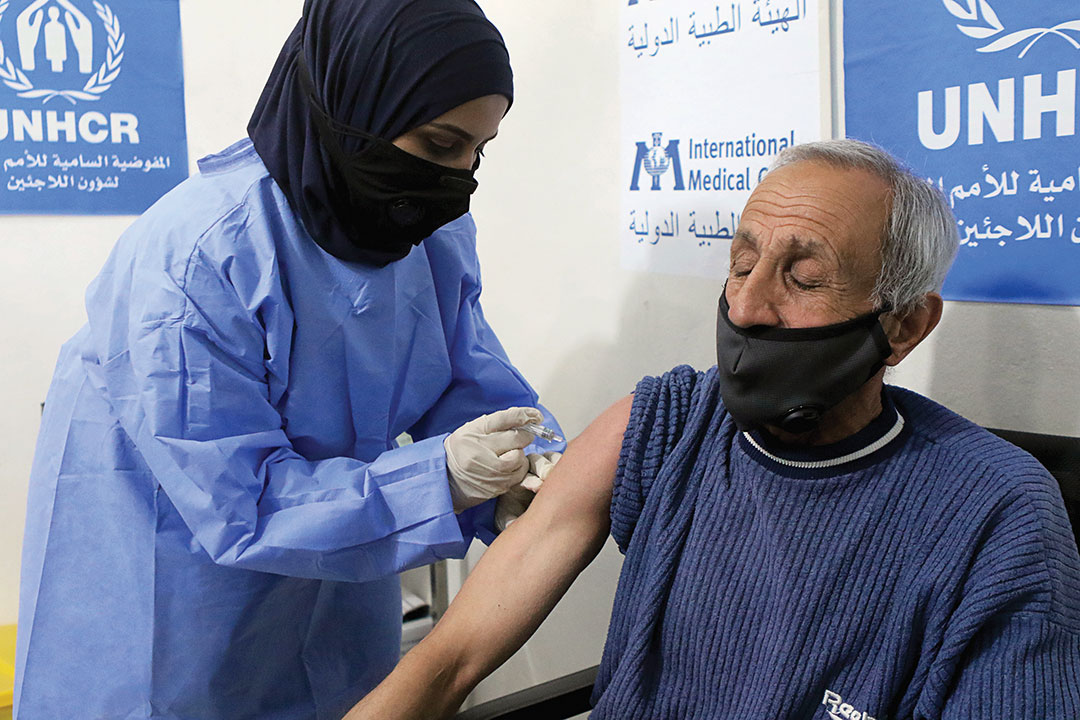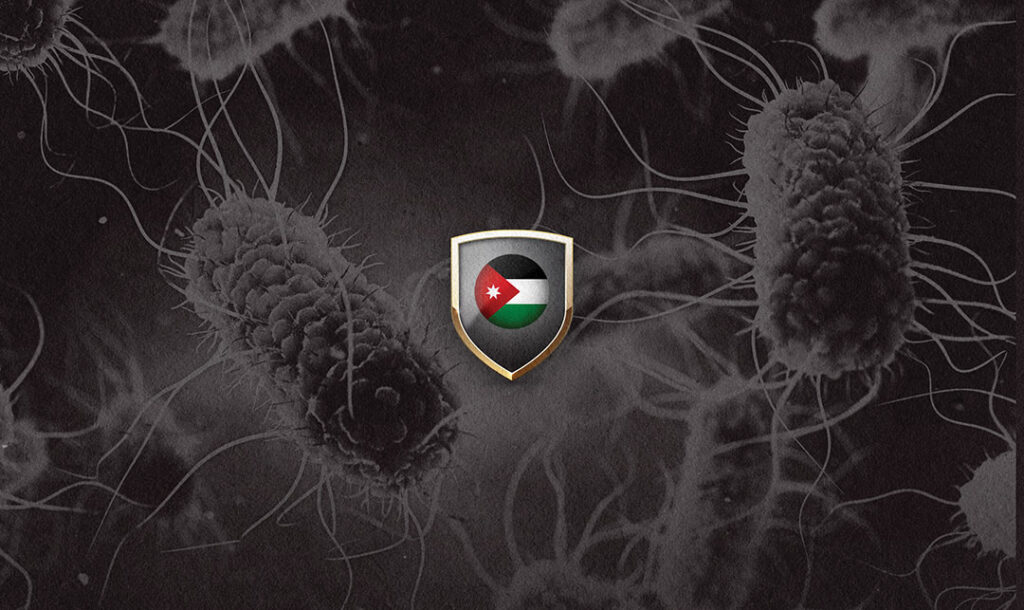
When the COVID-19 pandemic began in 2020, security and military officials were confronted with a new challenge very different from liberating a city or hunting down a terrorist group. In response to this new threat, security and health authorities turned their attention to closing gaps between security and health institutions so they could combat epidemics and limit their spread. Just as countries race to shut their borders and scramble to prevent epidemics from recurring, they also prepare in case terrorist groups
plan to launch biological attacks to inflict heavy losses and disrupt the
global economic system.
Consequently, governments are trying to bridge the gaps between the security and health sectors to detect health threats early, control their spread and coordinate with first responders. Unipath met with Lt. Col. Amal Obeidat, public health specialist and epidemiologist at the Jordan Center for Disease Control (JCDC) to talk about the idea behind the center’s founding and its role in maintaining health security and preventing transmission of disease across borders.
Unipath: What is the idea behind the center’s founding and its importance to Jordan?
Lt. Col. Amal Obeidat: In light of emerging biological risks and new mutating diseases that appear from time to time, the Hashemite Kingdom of Jordan, like all other countries, faces the risk of communicable disease outbreaks and epidemics. Jordan’s geographic location — between several countries subject to internal conflicts, wars and repeated outbreaks of disease — makes it particularly vulnerable to the transmission of diseases from one country to another. We believe that an effective and immediate response is key to managing health security risks and health threats. That is why we review reports to evaluate past events and determine response effectiveness and speed, the most recent case being the COVID-19 pandemic. Through these reports, we found that all the institutions concerned with preparing for and responding to health risks performed exceptionally well, carrying out their key functions despite numerous obstacles and challenges. They managed to overcome these challenges by leveraging a number of mechanisms, either from within the institutions themselves or through cooperation with other governmental and nongovernmental organizations, as well as through cooperation and coordination with international organizations. The gap that has always existed between different institutions concerns a lack of coordination and cooperation between institutions tasked with incident response. The roles of the different institutions were unclear, and their specific responsibilities were not well defined. This often led to overlap and redundancies in roles that hindered a timely response to events.
From this standpoint, royal directives came from His Majesty King Abdullah II ibn Al Hussein to establish the JCDC. The center was founded in 2020, but its real work began after 2021. Its primary mission is to strengthen national capabilities in detecting, tracking, preparing for, preventing and combating health threats. JCDC also manages coordination and cooperation mechanisms between all relevant ministries and institutions with the primary goal of delivering health security.

The center consists of six main directorates: prevention and infectious disease control, epidemiological monitoring, laboratories, emergency preparedness and response, scientific research and studies and information technology. In the early days of setting up the center, each directorate conducted a countrywide survey and documented all existing efforts within their areas of specialization. Because we work at the level of strategic planning, it is important that we are aware of existing policies, strategies and standard operating procedures in all ministries concerned with communicable and epidemic disease response and prevention in Jordan to better define our role and identify what we can do on the subject of combating epidemics and communicable disease, how to respond, and how to develop a systematic and strategic plan of action.
We visited all relevant institutions, reviewed their files and plans, and developed a blueprint for cooperation and coordination between us and relevant ministries and institutions. One of the important outcomes of the field survey on health emergency response was a comprehensive nationwide plan for preparedness and response to communicable diseases and epidemics. This plan was developed strategically in cooperation and coordination with the Ministry of Health, the Armed Forces’ Royal Medical Services, and the Jordan Food and Drug Administration. The methodology of the plan is based on the ways in which epidemics spread. It specifies the primary role of each institution along with means of communication and cooperation to achieve the final objective. We also established a mechanism for implementing the plan in the event of a health emergency so that every institution will know its role and means of effective communication. We also trained and qualified the teams that play a part in the strategic plan at the national level.
Unipath: How did the center help reduce poor coordination and overlap between institutions?
Lt. Col. Amal Obeidat: Not only did it solve the problem of poor coordination; it also helped increase cooperation between relevant institutions. We put in place a standard and agreed-upon policy on how to communicate and respond to health events. Although the process is not 100% complete, we are on the right track to achieving this. Communication and coordination have become much better. We were able to identify the previously missing link between human and animal health. Our interest has always been in human health, but now we know that most of the dangerous diseases that have the potential to become epidemics originate with animals. This important distinction was previously missing. JCDC was able to establish channels of communication between the human and the veterinary health sectors with the aim of detecting threats early and preventing their transmission to humans.
Unipath: How have you staffed the center?
Lt. Col. Amal Obeidat: The center’s staffing is not yet complete. We started with a small number of staff and are expanding as needed. According to the plan drawn up at the beginning, the number of staff will reach about 150. As of mid-2024, we have a staff of about 45 people, 27 of whom are members with technical specializations while the rest are administrators. We are still in the early stages of things and are in the process of attracting expertise gradually, according to requirements.
Unipath: What is the role of the Jordan Armed Forces in supporting the center?
Lt. Col. Amal Obeidat: The Armed Forces are supportive at all levels. In the early days of getting the center up and running, there was a drive to recruit Jordanian expertise, particularly from government agencies. These efforts included the Ministry of Health and the Royal Medical Services (RMS). In all health-related incidents that occur across the Kingdom, the RMS plays a primary support role to the Ministry of Health and all parties charged with combating and preventing diseases and epidemics. The RMS is part of the government sector and provides its services to members of the Jordan Armed Forces and their families. It provides more than 30% of health services at the national level and operates several hospitals and medical centers while training the staff that works there.
However, when there are health-related incidents and threats, like the spread of some epidemic, it acts as the primary support for the Ministry of Health by opening some of its hospitals and medical centers to the public sector and providing the ministry with staff, expertise and specialists. The RMS has supported the center’s medical laboratories with its qualified personnel. There are other ways by which it can provide support in partnership with the Armed Forces, such as preparing to receive civil and military aircraft equipped for ambulance and rescue operations and giving access to its strategic stocks of medical supplies, personal protective equipment and vaccines. It also leverages its media resources, like the Directorate of Military Information, and the deployment of rapid response teams to the Armed Forces, as well as aiding epidemiological investigations and following up with stakeholders and their families. The best example of this was the mobilization of all of the Armed Forces’ specializations during the COVID-19 pandemic.
Unipath: How important is international partnership and cooperation in limiting the spread of epidemics?
Lt. Col. Amal Obeidat: The risk of cross-border disease transmission is a challenge that all countries face. This is especially true for a country like Jordan, which neighbors war and conflict-affected nations that can often become hotbeds for the outbreak of epidemics and disease and that may become a staging ground for terrorist organizations to experiment with biological weapons. Moreover, some neighboring countries have already suffered greatly from cholera outbreaks. If a country shares borders with many neighbors, the risks of epidemics crossing borders are multiplied. There must be agreements between these countries to share information about any threats that may arise in their communities. This should be supported by laboratory results and details on how the disease spreads as well as its symptoms, so that suspected cases can be identified and monitored in order to limit its spread. When countries have an established policy and cooperate on matters of health, we will be more immune to disease transmission and better prepared for prevention. Without this kind of international cooperation, international health organizations become more important in filling this void so that every country knows its role and responsibilities for managing incidents and securing communication channels between countries so that they can share the latest developments and health risks. We have laboratories provided to us by the Canadian government, and we have direct cooperation with the U.S. Centers for Disease Control and Prevention with which we initiated a program to provide psychological and moral support to teams of first responders. The project began by assessing capabilities, updating procedures and setting primary conditions for members regarding the required experiences and training courses. There is also funding for training leaders and response team members. The U.S. Department of Defense’s Defense Threat Reduction Agency also played a key role in providing support and specialized training. During COVID-19, the capabilities of the Jordanian health sector were assessed. This revealed a shortage of expertise in intensive care specializations. In light of this, strengthening our capabilities through external qualification courses in cooperation with the U.S. has yielded excellent results.
Unipath: How is the cooperation between country-specific epidemic control centers in the region?
Lt. Col. Amal Obeidat: There is cooperation at the governmental and ministerial levels, but not between institutions and centers. This is where the role of international organizations comes into play. For example, the World Health Organization (WHO) concluded an agreement with Syria, Jordan and Lebanon to prevent and confront outbreaks of cholera. A comprehensive policy of preventive measures was put in place, and a response plan was developed to prevent and tackle any such outbreaks.
Unipath: Do you have daily contact with international organizations?
Lt. Col. Amal Obeidat: We have direct contact with key bodies such as the Centers for Disease Control and Prevention, the WHO and the U.S. Agency for International Development, in addition to many others such as the U.S. Department of Defense’s Defense Threat Reduction Agency and the U.N. Relief and Works Agency (UNRWA). Regarding health threats, WHO asked Jordan to update its list of risks, since the last update was in 2019. This was done with technical support from WHO and UNRWA. It was an important event conducted as a workshop to which stakeholders from all state institutions were invited and during which we used strategic tools to assess threats. We also identified, classified and ranked threats the country might face, assigning a threat level to each. We are developing our plans based on priorities.
Unipath: What challenges does the center face?
Lt. Col. Amal Obeidat: The most important challenge is the absence of any legislative framework for authorizing the center as the body for managing incidents. We operate under a system, not a law. The Public Health Law passed in 2008 delegates responsibilities to the Ministry of Health since the center did not exist at that time. We are an independent body and not affiliated with the Ministry of Health. We suggest amending the Public Health Law to give the center the powers and authorization needed to manage incidents. Stakeholders agree that amending this law will aid health security and reduce the dangers associated with epidemics. The second issue is the difficulty in attracting expertise. The JCDC is a newly established center whose course and future are unclear. It is especially difficult to attract people with experience in this field who may have held their jobs for a long time and have job security that they can’t easily give up. They may view leaving their secure positions to join a new center as a risk. We have started to overcome this issue as the center’s work and reputation have become more familiar to people. In general, the basic role of a governmental health institution responsible for public health is not clear to people. When we participate in any health-related events, people always ask us who we are. And so, we have to make the effort to explain the center’s role and importance, even if the concept is not clear to them. There is also the issue of a lack of clarity surrounding the roles and responsibilities of different health institutions, especially if an entity had filled the gap in the past and leads other institutions. Because of that, we faced resistance from some parties in accepting the role the center has to play. We do not have enough national studies on the subject of health risk management, which means we are starting from scratch. There is also a lack of clarity on disaster response and health risk funding at the national level. We have had a lot of difficulty financing projects, especially within health institutions with no budgets for health risk management. We are working to resolve this issue through cooperation with international organizations and educating health institutions about the JCDC’s role, while also trying to obtain self-financing. Another issue is transparency within the health sector. When we began to study the challenges facing the health sector and to find solutions to them, we found tendencies in some of these institutions to hide gaps and flaws to project an ideal image of themselves.
Unipath: Talk a little more about viruses transmitted from animals to humans.
Lt. Col. Amal Obeidat: When we began to set up the center and develop a strategic business plan, we focused on educating the community. We encourage citizens to put any questions related to public health and the risks of epidemics to our center. Our first duty is to spread awareness about diseases and how to prevent them. Zoonotic infectious diseases are diseases that may be caused by bacterial, viral, parasitic or new nontraditional factors. They are transmitted from animals to humans and are able to spread between humans through direct contact, food, water or air. The problem lies in the close relationship humans have with animals, be they domestic, agricultural or wild. This may lead to a suspension of commercial production of certain animal products. Pollution of the environment, water, food and other causative factors can trigger mutations that lead to new strains of diseases that infect only humans. The greatest danger is the possibility of several recurring outbreaks among humans that may turn into global pandemics.

